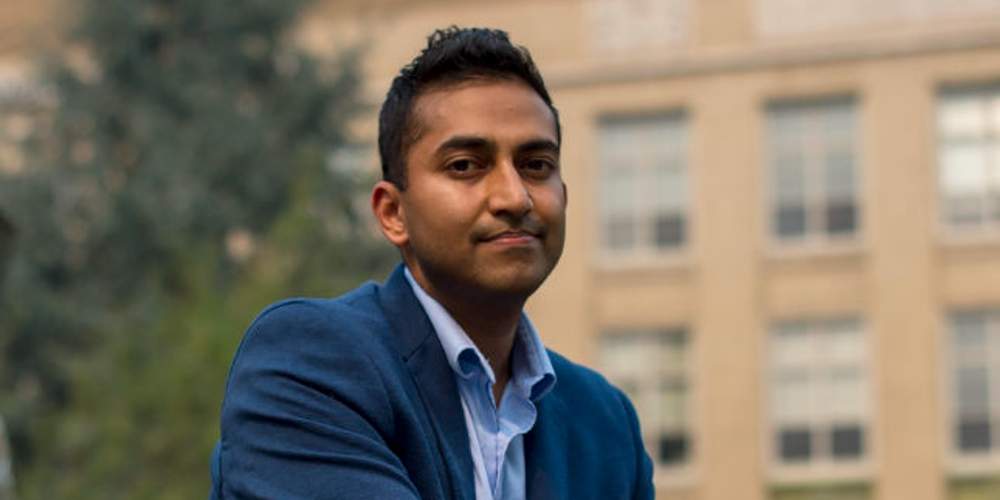Vinay Prasad, M.D., MPH, this week addressed misleading information about kids and COVID-19 vaccines coming from four sources: The New York Times, former Biden COVID-19 response advisor Andy Slavitt, head of COVID-19 response Dr. Ashish Jha, and the Brown University School of Public Health.
Prasad made the comments in his videotaped response to news coverage of the June 15 decision to recommend Pfizer and Moderna’s COVID-19 vaccines for infants and young children.
-
Learn the TRUTH about Gold IRAs and how most precious metals companies play dirty.
Prasad had a message for the “experts” hoping to convince parents to have their young children vaccinated against COVID-19: “You’re not persuading anybody.”
“You’re laying it on a little thick and you’re not being honest about it, and in the process you’re discrediting yourself,” Prasad said.
Prasad, a hematologist-oncologist and associate professor in the department of epidemiology and biostatistics at the University of California, San Francisco, has been critical of COVID-19 vaccines — and especially their use in children — since the vaccines’ introduction. He cited a New York Times article that stated:
“Some parents may be uninterested [in the vaccines] because their children were among the 75 percent thought to have already been infected.
“But vaccination provides more powerful and consistent protection even if a child has already been infected, [Centers for Disease Control and Prevention] scientists noted on Saturday.”
“The truth is … they don’t know that to be true,” Prasad said. “If a child has already had COVID, [and] recovered from COVID, we do not know that they have a further reduction in MIS-C [Multisystem Inflammatory Syndrome in Children], death, hospitalization, etc., from a potential reinfection.”
“It’s a lie,” he added. “The best they could say is that although some people speculate that to be the case, we currently have no large-scale randomized evidence to support that claim. We don’t even have observational data to support that claim in this age group.”
Prasad then addressed a tweet from Slavitt:
Now polls say only 20% of parents will vaccinate their < 5 year olds.
I will address that in a second, but the most important point for parents is that anyone who wants to can do it. And that is a game changer.
We know it protects against serious illness & long COVID. 9/
— Andy Slavitt
(@ASlavitt) June 20, 2022
“Well, actually, you don’t know that, Andy,” said Prasad, addressing Slavitt’s claim that the vaccine protects against serious illness and “long COVID.”
In fact, “People should report this to Twitter for misinformation,” he said.
Vaccine trials in young children were too small to lead to any comment about serious illness, he said.
“Severe disease is [so] infrequent that no one can say anything about that, and you certainly don’t know about long COVID — that wasn’t even a measured endpoint in these studies.”
“And … what’s even the definition of long COVID in kids?” he asked. “We’ll have to sort that out first. It’s a lie, it’s an exaggeration, it’s trying to get somebody to do something but it’s not being perfectly honest.”
Prasad also examined a statement Jha made Monday on “Good Morning America”: “The evidence is really clear that vaccinations prevent hospitalizations and serious illness, including in kids.”
This was in response to host George Stephanopoulos asking if a child younger than 5 who has already had COVID-19 and recovered should get a COVID-19 vaccine. This answer is factually incorrect and an exaggeration to achieve a policy goal, said Prasad. “The real answer is we don’t know.”
“We do not have any evidence that would support that claim,” he said. “We do not have evidence that vaccination improves any health outcome for [children], and we certainly don’t have the evidence that it prevents hospitalization serious illness in those kids.”
Prasad then tackled a Brown University School of Public Health “tip sheet” titled “Talking About Covid-19 Vaccines for Children Six Months to Four Years Old.”
The tip sheet was produced “in an effort to provide timely knowledge and evidence-based talking points for public health professionals, healthcare workers and others” on COVID-19 vaccines for children as young as 6 months.
Prasad called the tip sheet “the opinions of a few people who are self-anointed experts masquerading as evidence.”
The authors of the sheet claim: “We know from vaccinations in 5- 17-year-olds that hospitalization, critical illness and deaths are all more common among kids and teens who are not vaccinated than kids and teens who are vaccinated and boosted.”
Prasad disagreed. Due to poor study design, he said, “We really don’t know, especially in kids 5 to 11, if [vaccination] actually lowers hospitalization or MIS-C.”
“I haven’t yet seen a good study to persuade me, particularly in kids who’ve had COVID,” he said.
The tip sheet also says that in studies conducted by Pfizer and Moderna, vaccines “reduced the rate of ANY infection by between 37-80%. Although the overall number of cases were low, both vaccines are expected to decrease hospitalizations and ICU stays, as well.”
Prasad responded, “You may expect that to be the case, but some of us want data, not expectations by people who have a certain point of view.”
“That claim that these vaccines have been found to be 37% to 80% effective is a lie. It’s untrue,” he added.
Prasad summed up the treatment of people with concerns about the vaccine with a tweet from Eric Weinstein:
The way I hear it: we assume the argument that all good parents agree:
“COVID vaccines = Clear Pure Good. Slam dunk. Costless & Riskless. No Brainer. Science.”
“Vaccine concerns = Right Wing / AltRight, anti-science mental illness. Fox Newsesque. MAGA Adjacent. Anti-American.”
— Eric Weinstein (@EricRWeinstein) June 22, 2022
“I think Eric Weinstein is right,” said Prasad. “Nobody likes the feeling of somebody selling you something. Everyone can tell the evidence is sparse.”
“People are just proselytizing and exaggerating on TV and there’s not really a dialogue about what’s known or not known.”
If health experts had just presented the public with both known and unknown information about the vaccines, he said — if they had admitted that most likely, both the risks and the benefits of the vaccine are “probably pretty low” — we would have more trust in their guidance.
“Just tell the truth,” Prasad urged.
Instead, health authorities “are exaggerating and lying and distorting the truth.”
Watch the video here:
© 2022 Children’s Health Defense, Inc. This work is reproduced and distributed with the permission of Children’s Health Defense, Inc. Want to learn more from Children’s Health Defense? Sign up for free news and updates from Robert F. Kennedy, Jr. and the Children’s Health Defense. Your donation will help to support us in our efforts.





